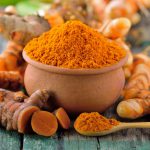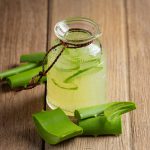Your liver silently works day and night, filtering toxins, processing nutrients, and maintaining overall balance.…
Read MoreTurmeric has been used medicinally for nearly 4000 years. Many bioactive compounds such as curcuminoids, volatile oils, polysaccharides, and sesquiterpenes are present in this important plant. The most studied component in turmeric is a curcuminoid known as curcumin which is linked to many of its health benefits.[1]Prasad, Sahdeo, and Bharat B. Aggarwal. “Turmeric, the golden spice.” Herbal Medicine: Biomolecular and Clinical Aspects. 2nd edition (2011).
Turmeric is highly valued in ayurveda. It is considered to be tikta (bitter), katu (pungent) with the qualities of rooksha (dryness), laghu (lightness). Its potency is considered to be ushna (hot). Since it is dry, bitter, and pungent it balances kapha. Because of its ‘hot’ potency, it balances vata and kapha. Meanwhile, its bitterness helps it balance pitta. Therefore, turmeric is capable of balancing all three doshas.
In ayurveda, it is considered to have a range of medicinal properties such as pramehaharaanam (useful in urinary tract infections and diabetes), vishanut (useful in toxic conditions), kanduhara (relieves itching due to allergies), kushtahara (useful in treating a wide variety of skin diseases), vranahara (helps heal wounds), dehavarna vidhayini (improves complexion), vishodhini (natural detoxifier), krumihara (fights intestinal worms and helps with infected wounds), pinasa nashini (useful in dealing with a running nose, or upper respiratory tract infection), aruchinashini (useful in anorexia), panduhara (useful in anemia, and initial stages of liver disorders), twakdoshajit (detoxifies blood and skin), vishothajit (natural anti inflammatory), and vatasranut (useful in gout).
Turmeric, and consequently turmeric milk, has a variety of benefits. Let’s look at some important benefits of turmeric milk. It:
Research indicates that turmeric has pain-relieving properties. It has been found to ease pain caused by a range of conditions such as rheumatoid arthritis, osteoarthritis, gout, fibromyalgia, etc. Curcuminoids present in turmeric are thought to be responsible for this effect. Curcumin acts by inhibiting the production of PGE2 which is a mediator of inflammation and by depleting substance P, a neurotransmitter which relays pain messages to the brain.[2]Sahebkar, Amirhossein, and Yves Henrotin. “Analgesic efficacy and safety of curcuminoids in clinical practice: a systematic review and meta-analysis of randomized controlled trials.” Pain … Continue reading
Diabetes is a condition characterized by high blood sugar that’s becoming increasingly common. Over time, this condition can cause complications such as heart disease, nerve damage, kidney disease, and eye problems.[3][Diabetes](https://www.niddk.nih.gov/health-information/diabetes “Diabetes”). National Institutes of Health. But animal studies have found that curcumin can lower blood sugar in diabetic rats. It was also able to reduce oxidative stress, which is caused by an imbalance between free radicals and antioxidants in the body. This can be helpful to people with high blood sugar levels as oxidative stress plays a significant role in many diabetic complications.[4]Arun, N., and N. Nalini. “Efficacy of turmeric on blood sugar and polyol pathway in diabetic albino rats.” Plant foods for human nutrition 57, no. 1 (2002): 41-52.
Blood pressure and cholesterol are two important factors that affect the health of your heart.[5][Heart Diseases](https://medlineplus.gov/heartdiseases.html “Heart Diseases”).U.S. National Library of medicine. And studies indicate that one of the key benefits of turmeric milk is that it can lower total cholesterol levels while increasing levels of HDL or good cholesterol. It also lowers systolic blood pressure when you take it for 12 weeks or more.[6]Soni, K., and R. Kutian. “Effecf of oral curcumin administranon on serum peroxides and cholesterol levels in human volunteers.” Indian J Physiol Phannacoll992 36, no. 4 (1992): 273-275. [7]Hadi, Amir, Makan Pourmasoumi, Ehsan Ghaedi, and Amirhossein Sahebkar. “The effect of Curcumin/Turmeric on blood pressure modulation: A systematic review and meta-analysis.” … Continue reading So, this spice can help keep your heart healthy since it has such a potent effect on factors that affect the heart.
Turmeric milk has traditionally been used to fight off an annoying cough or cold. Does this have any scientific backing? Yes, turmeric has antiviral and antibacterial properties and can act against germs which infect your respiratory system. For example, one study found that it prevents the respiratory syncytial virus – which typically causes mild cold like symptoms, but can also cause bronchitis and asthma – from multiplying. [8]Obata, Kazufumi, Takashi Kojima, Tomoyuki Masaki, Tamaki Okabayashi, Shinichi Yokota, Satoshi Hirakawa, Kazuaki Nomura et al. “Curcumin prevents replication of respiratory syncytial virus and … Continue reading
We encounter a variety of harmful germs in our day-to-day life. But our immune system fights them off and protects us from diseases and infections. Studies show that turmeric acts as an immunomodulatory agent which can stimulate our immune system. That’s not all. Turmeric also has anti-inflammatory effects. Inflammation is a useful response by your immune system which helps you fight infection. However, chronic inflammation can be quite harmful. In fact, it has been associated with many medical conditions ranging from arthritis, cancer, asthma, type-2 diabetes and heart disease to Alzheimer’s.[9][Inflammation](https://my.clevelandclinic.org/health/symptoms/21660-inflammation “Inflammation”).Cleveland Clinic. [10]Chandrasekaran, Chinampudur V., Jothie R. Edwin Kannan Sundarajan, Giligar M. Gururaja, Deepak Mundkinajeddu, and Amit Agarwal. “Immune-stimulatory and anti-inflammatory activities of Curcuma … Continue reading
One study looked at the effects of curcumin in healthy older (60 to 85 years) people. It found that an hour after having curcumin they performed better on tasks requiring sustained attention and working memory in comparison to those who had taken a placebo. Taking curcumin for 4 weeks not only improved working memory but also mood (general fatigue and fatigue due to psychological stress, calmness, and contentedness) significantly.[11]Cox, Katherine HM, Andrew Pipingas, and Andrew B. Scholey. “Investigation of the effects of solid lipid curcumin on cognition and mood in a healthy older population.” Journal of … Continue reading
Turmeric also has proven anti-allergy properties – one animal study found that treatment with curcumin offered significant relief from the symptoms of food allergy.[12]Shin, Hee Soon, Hye-Jeong See, Sun Young Jung, Dae Woon Choi, Da-Ae Kwon, Min-Jung Bae, Ki-Seung Sung, and Dong-Hwa Shon. “Turmeric (Curcuma longa) attenuates food allergy symptoms by … Continue reading So how does it work? One possible mechanism is by inhibiting the release of histamine.[13]Kurup, Viswanath P., and Christy S. Barrios. “Immunomodulatory effects of curcumin in allergy.” Molecular nutrition & food research 52, no. 9 (2008): 1031-1039. Histamine is a chemical present in our bodies. It causes many symptoms associated with an allergic reaction such as sneezing or a runny nose. When someone is allergic to a substance their immune system wrongly thinks that this harmless substance is dangerous and prompts the release of histamine into their blood stream. Histamine can act on your nose, throat, eyes, lungs, gastrointestinal, or skin to cause allergy symptoms.[14][Definition: Histamine](https://kidshealth.org/en/parents/histamine.html “Definition: Histamine”).The Nemours Foundation.
Ayurveda has traditionally valued turmeric as a spice that improved digestion. It is thought that turmeric is able to relieve indigestion due to its ability to stimulate the production of bile. One study found that administering powdered turmeric was useful for people suffering from indigestion. It not only eased indigestion but also reduced flatulence.[15]Thamlikitkul, V. I. S. A. N. U., N. Bunyapraphatsara, T. Dechatiwongse, S. Theerapong, C. Chantrakul, T. Thanaveerasuwan, S. Nimitnon et al. “Randomized double blind study of Curcuma domestica … Continue reading Turmeric has also been found to inhibit the growth of helicobacter pylori, which is a bacteria that can infect your stomach and cause indigestion.[16][Indigestion](https://www.nhs.uk/conditions/indigestion/ “Indigestion”).NHS,UK. [17]Mahady, Gail B., S. L. Pendland, G. Yun, and Z. Z. Lu. “Turmeric (Curcuma longa) and curcumin inhibit the growth of Helicobacter pylori, a group 1 carcinogen.” Anticancer research 22, no. … Continue reading
Oxidative stress plays a significant role in the development of many diseases such as cataract, autoimmune disorders, cardiovascular problems, cancer, rheumatoid arthritis, and neurodegenerative diseases. However, antioxidants help counter free radicals and relieve oxidative stress.[18] Pham-Huy, Lien Ai, Hua He, and Chuong Pham-Huy. “Free radicals, antioxidants in disease and health.” International journal of biomedical science: IJBS 4, no. 2 (2008): 89. (https://www.ncbi.nlm.nih.gov/pmc/articles/PMC3614697/) Research indicates that turmeric can be helpful here as it has powerful antioxidant properties.[19]Tanvir, E. M., Md Hossen, Md Hossain, Rizwana Afroz, Siew Hua Gan, Md Khalil, and Nurul Karim. “Antioxidant properties of popular turmeric (Curcuma longa) varieties from Bangladesh.” … Continue reading
Many animal and lab studies suggest that curcumin may slow the spread of cancer, help prevent cancer, and improve the effectiveness of chemotherapy. The anti-oxidant and anti-inflammatory properties of curcumin are thought to be responsible for its effects against cancer. However, it is important to keep in mind that research in this area is still ongoing. Turmeric is not currently recommended for treating cancer but it could be one of the key benefits of turmeric milk.[20][Curcumin: Can it slow cancer growth?](https://www.mayoclinic.org/diseases-conditions/cancer/expert-answers/curcumin/faq-20057858 “Curcumin: Can it slow cancer growth?”).Mayo Clinic.
References
| ↑1 | Prasad, Sahdeo, and Bharat B. Aggarwal. “Turmeric, the golden spice.” Herbal Medicine: Biomolecular and Clinical Aspects. 2nd edition (2011). |
|---|---|
| ↑2 | Sahebkar, Amirhossein, and Yves Henrotin. “Analgesic efficacy and safety of curcuminoids in clinical practice: a systematic review and meta-analysis of randomized controlled trials.” Pain medicine 17, no. 6 (2016): 1192-1202. |
| ↑3 | [Diabetes](https://www.niddk.nih.gov/health-information/diabetes “Diabetes”). National Institutes of Health. |
| ↑4 | Arun, N., and N. Nalini. “Efficacy of turmeric on blood sugar and polyol pathway in diabetic albino rats.” Plant foods for human nutrition 57, no. 1 (2002): 41-52. |
| ↑5 | [Heart Diseases](https://medlineplus.gov/heartdiseases.html “Heart Diseases”).U.S. National Library of medicine. |
| ↑6 | Soni, K., and R. Kutian. “Effecf of oral curcumin administranon on serum peroxides and cholesterol levels in human volunteers.” Indian J Physiol Phannacoll992 36, no. 4 (1992): 273-275. |
| ↑7 | Hadi, Amir, Makan Pourmasoumi, Ehsan Ghaedi, and Amirhossein Sahebkar. “The effect of Curcumin/Turmeric on blood pressure modulation: A systematic review and meta-analysis.” Pharmacological research 150 (2019): 104505. |
| ↑8 | Obata, Kazufumi, Takashi Kojima, Tomoyuki Masaki, Tamaki Okabayashi, Shinichi Yokota, Satoshi Hirakawa, Kazuaki Nomura et al. “Curcumin prevents replication of respiratory syncytial virus and the epithelial responses to it in human nasal epithelial cells.” PLoS One 8, no. 9 (2013): e70225. |
| ↑9 | [Inflammation](https://my.clevelandclinic.org/health/symptoms/21660-inflammation “Inflammation”).Cleveland Clinic. |
| ↑10 | Chandrasekaran, Chinampudur V., Jothie R. Edwin Kannan Sundarajan, Giligar M. Gururaja, Deepak Mundkinajeddu, and Amit Agarwal. “Immune-stimulatory and anti-inflammatory activities of Curcuma longa extract and its polysaccharide fraction.” Pharmacognosy Research 5, no. 2 (2013): 71. |
| ↑11 | Cox, Katherine HM, Andrew Pipingas, and Andrew B. Scholey. “Investigation of the effects of solid lipid curcumin on cognition and mood in a healthy older population.” Journal of psychopharmacology 29, no. 5 (2015): 642-651. |
| ↑12 | Shin, Hee Soon, Hye-Jeong See, Sun Young Jung, Dae Woon Choi, Da-Ae Kwon, Min-Jung Bae, Ki-Seung Sung, and Dong-Hwa Shon. “Turmeric (Curcuma longa) attenuates food allergy symptoms by regulating type 1/type 2 helper T cells (Th1/Th2) balance in a mouse model of food allergy.” Journal of ethnopharmacology 175 (2015): 21-29. |
| ↑13 | Kurup, Viswanath P., and Christy S. Barrios. “Immunomodulatory effects of curcumin in allergy.” Molecular nutrition & food research 52, no. 9 (2008): 1031-1039. |
| ↑14 | [Definition: Histamine](https://kidshealth.org/en/parents/histamine.html “Definition: Histamine”).The Nemours Foundation. |
| ↑15 | Thamlikitkul, V. I. S. A. N. U., N. Bunyapraphatsara, T. Dechatiwongse, S. Theerapong, C. Chantrakul, T. Thanaveerasuwan, S. Nimitnon et al. “Randomized double blind study of Curcuma domestica Val. for dyspepsia.” J Med Assoc Thai 72, no. 11 (1989): 613-20. |
| ↑16 | [Indigestion](https://www.nhs.uk/conditions/indigestion/ “Indigestion”).NHS,UK. |
| ↑17 | Mahady, Gail B., S. L. Pendland, G. Yun, and Z. Z. Lu. “Turmeric (Curcuma longa) and curcumin inhibit the growth of Helicobacter pylori, a group 1 carcinogen.” Anticancer research 22, no. 6C (2002): 4179-4181. |
| ↑18 | Pham-Huy, Lien Ai, Hua He, and Chuong Pham-Huy. “Free radicals, antioxidants in disease and health.” International journal of biomedical science: IJBS 4, no. 2 (2008): 89. |
| ↑19 | Tanvir, E. M., Md Hossen, Md Hossain, Rizwana Afroz, Siew Hua Gan, Md Khalil, and Nurul Karim. “Antioxidant properties of popular turmeric (Curcuma longa) varieties from Bangladesh.” Journal of Food Quality 2017 (2017). |
| ↑20 | [Curcumin: Can it slow cancer growth?](https://www.mayoclinic.org/diseases-conditions/cancer/expert-answers/curcumin/faq-20057858 “Curcumin: Can it slow cancer growth?”).Mayo Clinic. |
| ↑21 | [What Is Turmeric?](https://www.verywellhealth.com/turmeric-for-pain-relief-can-it-help-4173236 “What Is Turmeric?”).Verywell Health. |
| ↑22 | [Turmeric: potential adverse effects and interactions](https://www.sps.nhs.uk/articles/turmeric-potential-adverse-effects-and-interactions/ “Turmeric: potential adverse effects and interactions”).NHS,uk. |


Dr. Manjula has 12 years of experience in the field of Ayurveda and worked as a Consultant and General Physician for over 5 years before starting her private practice. In addition to BAMS, she also has an Advanced Diploma in Clinical Research and is trained in Panchkarma. She is an expert at diagnosis of the root cause and planning effective treatment for multiple issues.

Your liver silently works day and night, filtering toxins, processing nutrients, and maintaining overall balance.…
Read More
We’ve all been there, reaching for chips, chocolate, or that extra serving of dessert after…
Read More
We know that the way we feel and our overall wellness is intrinsically connected to…
Read More
Aloe vera plant has been used for its medicinal, skincare, and health benefits for centuries…
Read More